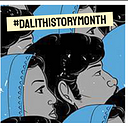Matangi: Experiencing Equality
~560–480 B.C.E
by Anita Das
Today in Dalit history, we revisit the story of a bhikkuni, or a Buddhist nun, from the “untouchable” Matang caste. She was variously written in Buddhist sciptures as Prakirti, Chandalika, or just Matangi.
Matangi’s brush with Buddhism began on a day when she was drawing water from a well. Ananda, one of the Buddha’s closest disciples, was was walking by her neighborhood, when he saw Matangi with water pots. Thirsty, he asked her for water. Matangi was nervous and fearful at this request. She knew what happened to her people when they shared water with the “upper” castes.
“I cannot give you water. Do you not see that I am from an untouchable caste?”
Ananda, calmly replied, “ I did not ask you for your caste — I asked you for water to drink.”
This whole request was new to her. She couldn’t believe someone thought it fine to drink water from her. She knew the lines society had drawn and her place in it. She was a Matang woman whose fundamental humanity had always been shunned. So why was this stranger breaking these ritual norms, she wondered.
Her curiosity got the best of her, and she began to ask Ananda a hundred questions — Where was he from? Why was he there? What religion did he practice that allowed him to drink from an untouchable’s hand?
This unusual reception of her humanity, her first experience of equality, was profound and caused her to fall in love with Ananda. As he was a celibate monk of the Buddha’s order, he led her to the Buddha.
After spending time in the presence of the Buddha and learning about Buddhism, she realized that her love for Ananda was, in fact, a reflection of a love for deeper existential equity. She then asked the Buddha to allow her to join the sangha as a bhikkuni. The Buddha welcomed her into the fold and it is at this moment, that she is said to have become one of the earliest bhikkunis of the Sangha.
In her time in the sangha, she continued to challege and redefine social inequality. Aninteresting debate is recorded upon her induction into the sangha, the once-Brahmin King Prasanjit and other former Kshatriya members of the Sangha staged a protest.
“Lord, a Brahmin and a Chandala (untouchable) cannot worship together! They cannot even share space together!” They reprimanded the Buddha for this conduct.
However, the Buddha replied, “The Brahmin is not born of friction between pieces of dry wood, he does not descend from the sky or the wind and does not arise piercing the earth. A Brahmin is born from a womb just as a Chandala is. Nature itself contradicts the assumptions of inequalities between people. She shall stay and she shall serve the Sangha!”
Matangi’s story documents the fortitude of early “untouchable” women and the possibilities that, at the time, new and revolutionary faiths like Buddhism, offered to change the lives of the oppressed.
Anita Das is an independant scholar interested in women and the liberatory traditions of Buddhism.
